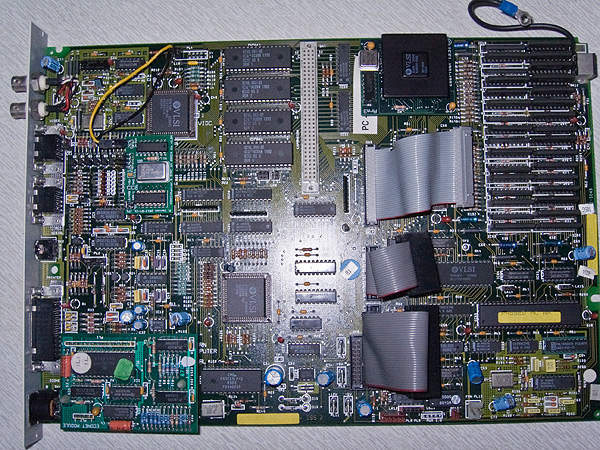Acorn Archimedes A410/1
The Archimedes A410/1 was launched in June 1989 and was the entry level machine in the newly updated 400/1 series with the other two machines in the series being the A420/1 and A440/1. The only differences between the three machines in the series was the level of expansion fitted at the time of manufacture and the A410/1 could be expanded to the full A440/1 specification using official upgrade packages.
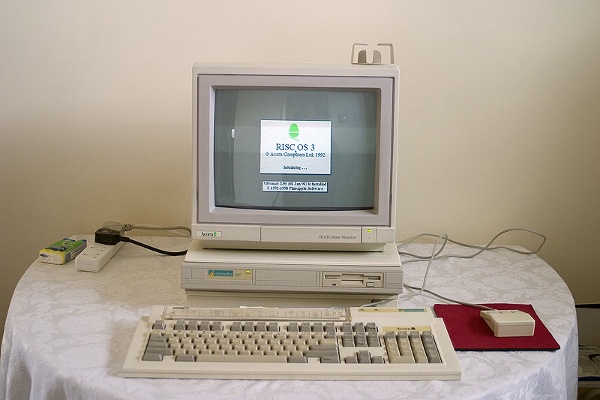
This Archimedes A410/1 was given to me as a gift in around 2005. At the time, it was fully upgraded to the A440/1 specification and since then, it has been expanded beyond the specifications of the original A400/1 series design by adding several Acorn and third party upgrades such as an Econet module, an IFEL ARM3 CPU, an Ethernet card, a Simtec IDE interface paired with a 2GB Compact Flash card for storage and a VIDC Enhancer to increase the possible display resolutions to match the Acorn A5000 and later machines.
It is now employed as my day-to-day Acorn software development machine and when necessary, as an Econet Level 4 fileserver providing a bridge between a modern Ethernet network and the proprietary Acorn Econet network that connects several of my Acorn computers together.
Expansions in this A410/1
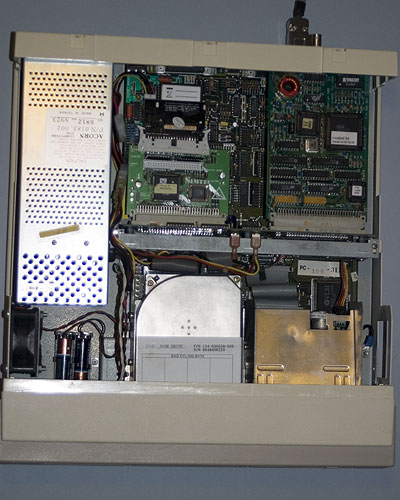
- Unplugged but working 40Mb ST506 HDD (added by the original owner) (last tested March 2012)
- Econet Module
- Simtec 16-bit IDE interface with 2Gb CF card
- i-Cubed EtherLAN 550 Ethernet card
- IFEL 25MHz ARM3 CPU upgrade
- RetroKit Ultra VIDC Enhancer & Sync on Green fix
- 4Mb RAM upgrade (added by the original owner)
- RISC OS 3.11 (the original owner upgraded to RISC OS 3.10)
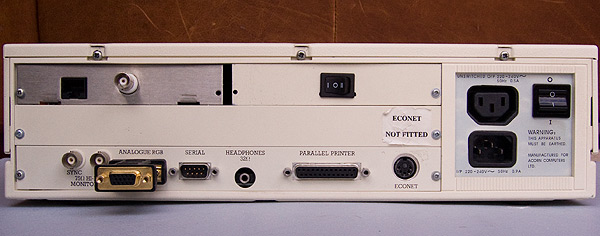
The upgrades in this Archimedes effectively put it on a par with a basic Acorn A5000 (with the exception of high density floppy disc support) which was launched in 1991, two years after the A400/1 series. Due to the memory being clocked slightly slower than the A5000, overall performance of the processor measured in MIPS is approximately 0.75 MIPS slower than the A5000 but in every other respect, it's capabilities are the same. Arguably this is one of the reasons why later Acorn machines weren't as popular because the performance increase they delivered was not sufficient enough to leap far enough ahead of older Acorn machines with third party upgrades so existing users didn't necessarily have enough reasons to upgrade. In fact, The A400/1 series could be upgraded with a 36MHz ARM3 processor which then exceeded the standard A5000 and matched the Acorn A5000 Alpha for raw MIPS performance.
The A410/1 in action
The YouTube video below shows the Archimedes A410/1 from power on going through its POST sequence and then booting using the Uniboot install before reaching the desktop, pinging a website and browsing the Internet before shutting down. In addition to the video, here's a collection of screen shots of the Archimedes browsing various sites on the web.
Repair/Change History
An Econet interface module and an i-Cubed EtherLAN 550 network card were added to provide networking services to the BBC Micro’s using the Oak Level 4 Fileserver software (the Archimedes version of the Acorn Level 3 Fileserver software) and gain Internet/Intranet access to allow for the easier transfer of files to the machine over a TCP/IP based network.
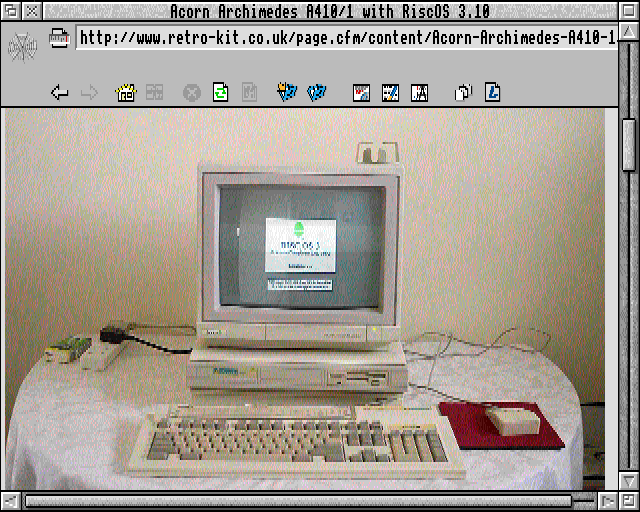
The Uniboot configuration was installed to allow for easier expansion/configuration and provide support for TCP/IP networking. The Uniboot configuration has also been significantly upgraded with changes to the boot sequence, updates to several relocatable modules and the addition of extra software for RISC OS providing a more stable and up to date environment.
The keyboard has been stripped down and cleaned with Servisol switch cleaner to repair several malfunctioning keys due to the build up of dirt.
A Simtec 16-bit IDE podule was added to allow a Compact Flash IDE adapter to be added with a 2Gb Compact Flash card upgrading the storage from the ST506 40MB drive to 4 x 512MB partitions. Although fully working with no verification errors, the ST506 hard drives power was disconnected in an effort to preserve the drive further into the future.
In August 2011, the IFEL ARM3 CPU upgrade was installed improving the Archimedes raw throughput from 4.85 to 12.71 MIPS.
In November 2011, the Simtec IDE podule "failed" and caused all cards connected to the backplane to fail to initialise. Removing the card, cleaning the Euroconnector pins and extracting the Simtec IDE flash ROM and cleaning the socket contacts before re-seating the ROM and the card fixed the issue.
If February 2012, the machine was upgraded from RISC OS 3.10 to RISC OS 3.11. The difference is minor and not really required but it was done simply to bring all my RISC OS machines to the same level of OS.
In March 2012, I modified the A410/1 to allow it to connect to a VGA monitor after which, I decided to build my own VIDC Enhancer board which was completed in early June 2012 and when fitting the header to the Aux I/O outputs (PL9), I took the opportunity to take some photo's of the motherboard while out of the case. Fitted to the motherboard you can see the Acorn Econet module (bottom left), Retro-Kit VIDC Enhancer (middle left), IFEL ARM3 CPU upgrade (top right) and the 4MB RAM expansion (top far right).
In January 2013, I replaced the Dual VIDC Enhancer that I fitted with the newly designed and built Ultra VIDC Enhancer which provides all the same functionality in a single low profile PCB.
During the development of AutoVIDC, I temporarily fitted a Watford Electronics VIDC Enhancer in order to reverse engineer and develop independent software support for that type of VIDC Enhancer.
Points of interest
You'll never get lost with an Archimedes A410/1 in your pocket! Seriously though, the A410/1 motherboard has compass points printed on it for component location and orientation.

Battery replacement schedule
2 Duracell AA alkaline batteries fitted in October 2013.
The next battery change is due in October 2014.
Translate this site
Acorn Kit
Acorn Archimedes A400/1
Archimedes A400/1 Manuals
A400/1 maintenance
Other maintenance resources
Archimedes A400/1 resources
RISC OS links
RISC OS is the operating system that runs on all Archimedes and RISC PC's from Arthur in the beginning, to RISC OS 2 and onwards to RISC OS 4, 5 and 6 today.
IconBar posts
News
- RISC OS continues to grow on GitHub
- Archive magazine updates
- Wakefield 2022 will go ahead on Saturday 21st May
- Drag'n'Drop 11i2 edition reviewed
- RISCOSbits releases some more risque hardware
Forums
- RISCOSbits releases some more risque hardware
- Is BASIC still useful for coding?
- Is BASIC still useful for coding?
- Three RISC OS Show dates for your 2022 diary
- Iris Web Browser receives January update
provided courtesy of The IconBar
JASSP Forums
The JASSP project run by Jon Abbott is an attempt to acquire the rights to all of the Acorn Archimedes games back catalogue and archive them for the future.
Archiving the games is just half of the battle. Jon has written ADFFS which allows those archived images to be loaded and played on any ARM based machine running RISC OS which involves patching these games to run on later hardware using a JIT/VM style environment within ADFFS to allow the games to be patched to run safely on the latest hardware.
- ADFFS • Re: ADFFS 2.80 public beta
- ADFFS • Re: ADFFS 2.80 public beta
- ADFFS • Re: ADFFS 2.80 public beta
- ADFFS • Re: ADFFS 2.80 public beta
- ADFFS • Re: ADFFS 2.80 public beta
- General • Re: Help playing games
- General • Help playing games
- ADFFS • Re: ADFFS 2.80 public beta
- ADFFS • Re: ADFFS 2.80 public beta
- ADFFS • Re: ADFFS 2.80 public beta
- ADFFS • Re: ADFFS 2.80 public beta
- General • Re: Virtual Golf
- ADFFS • Re: ADFFS 2.80 public beta
- General • Re: Virtual Golf
- ADFFS • Re: ADFFS 2.80 public beta
